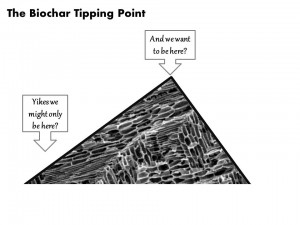I am a huge Malcom Gladwell fan and I recently reread his book “The Tipping Point: How Little Things Can Make a Big Difference”. As with nearly all of the non-fic books I read, I tend to think about how the information presented could be applied to the world of sustainability. More specifically with this book I was mulling over how Gladwell’s thinking could be used to help biochar reach a Tipping Point. Below are my mulled upon musings:
There are three overarching themes Gladwell promotes as being necessary for something to reach a tipping point which are:
- The Law of the Few – a few key people are needed to launch an epidemic (specifically Connectors, Mavens and Sales People)
- The Stickiness Factor – i.e. you can’t get something out of your head
- The Power of Context – conditions need to be right
Connectors tend to be people that participate in a variety of different niches. For biochar I think an ideal type of Connector could be Extension Agents or the folks at the USDA. They are connected to Academia as well as Farmers. I think we (biochar community) need to be working much more closely with this group!
Mavens are people that tend to know a lot and share their information easily. Hans-Peter Schmidt from the Ithaka Institute (nicknamed the CH’artist) is a fantastic example of this, as is my research buddy ‘Charchemides’(also known as Christian Pulver) to whom I owe a huge debt of gratitude for educating me on the underlying science of biochar. Folks like Albert Bates, Erich Knight and Dolph Cooke are also invaluable biochar sherpas (Charpas?).
Salespeople are charismatic, powerful negotiators that can influence people. I think there are a few individuals that are effective at promoting biochar but we don’t have nearly enough yet. One critical component for selling biochar is trustworthiness and sometimes I think ‘truthiness’ has been more prevalent. That could be detrimental to the long term prospects for biochar.
The Stickiness Factor is where I think the biochar world needs to focus a bit more attention. Many love to tout the carbon offset potential of biochar. Yet while this is one of the aspects that I find most promising about biochar for the planet, carbon offsets don’t make too many people swoon. So how to make biochar sticky? Therein lies the challenge…(perhaps we could engage the Ylvis brothers to write a song about biochar…?). We need more clever minds to help us ‘Dig the Change’ as I like to say.
And finally there is the Power of Context, which is the notion that improving small things may lead to epidemics or rapid broad-scale change (e.g. removing graffiti led to reduced overall crime in NYC). When I think of this for biochar, the first thing that comes to mind is that perhaps focusing biochar’s impact on climate change is the wrong lever. Even the focus on yield improvement is a bit of a slippery slope because while biochar has been shown to improve yield incredibly in depleted soils, in other trials yield impact has been minimal or even negative (Gasp! Yes it has happened. This is why I always pipe up and counsel people to ‘know what you sow’!.). Maybe if we focus on some specific things that farmers struggle with that biochar can address such as arsenic or e coli in their soils, odor problems in their lagoons, then biochar will begin to take off in other directions in the farming community. These are things that can have positive environmental, financial and social implications for farmers so they may be more persuasive and compelling than the focus on saving the planet.


